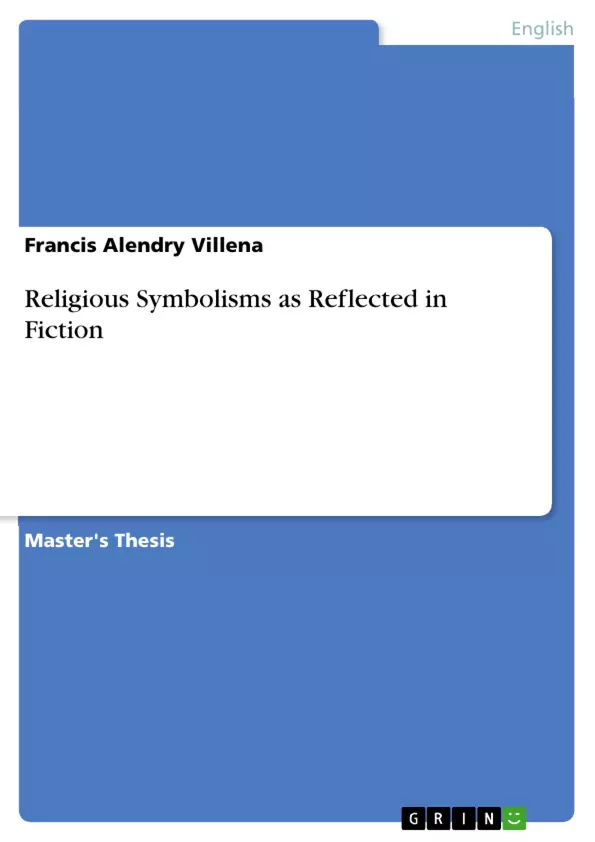
Religious Symbolisms as Reflected in Fiction
Masterarbeit, 2018
135 Seiten, Note: 1.50
Leseprobe
Inhaltsverzeichnis (Table of Contents)
- INTRODUCTION
- OBJECTIVES OF THE STUDY
- REVIEW OF LITERATURE
- METHODS
- Research Design
- Subject of the Study
- Materials Analyzed
- Procedure
- Ethical Considerations
- DISCUSSION
- Religious Symbolism Traced
- Animism
- Nirvana
- Divination
- Hope
- Spiritual Freedom
- Parallel Depiction of Characters
- Piousness
- Fundamentalism
- Reincarnation
- Negative Theology
- Pantheism
- Discipleship
- Redeemer
- Proposed Teaching Guide
- CONCLUSION
- RECOMMENDATIONS
- REFERENCES
- APPENDICES
Zielsetzung und Themenschwerpunkte (Objectives and Key Themes)
This thesis investigates the use of religious symbolism in selected fiction, aiming to understand how authors creatively express their own views on spirituality and religion's role in society. The study explores how religious symbolism serves as a reflection of the public's perception of religion and its influence on the social order. This analysis encompasses both the author's own perspective and their portrayal of the broader religious landscape.
- The evolution of religious symbolism in literature
- The relationship between religious symbolism and the author's personal beliefs
- The influence of religious symbolism on literary themes and character development
- The portrayal of diverse religious perspectives and practices in literary works
- The intersection of religious symbolism with cultural and social contexts
Zusammenfassung der Kapitel (Chapter Summaries)
The introduction explores the concept of religious symbolism and its significance in literature, highlighting how it reflects both individual perspectives and broader societal understandings of spirituality. The study establishes a historical context for the analysis, discussing how religious symbolism gained renewed importance in the 20th century, particularly through the works of scholars like Goldammer, Circlot, Cooper, and Reilly.
The discussion chapter delves into specific examples of religious symbolism traced in the selected literary works. It examines themes such as animism, nirvana, divination, hope, and spiritual freedom, as well as the portrayal of various religious personalities, including pious individuals, fundamentalists, and those who believe in reincarnation. The chapter further investigates concepts like negative theology, pantheism, discipleship, and the redeemer figure.
Schlüsselwörter (Keywords)
The key terms and concepts explored in this thesis include religious symbolism, spirituality, literary analysis, religious perspectives, social order, cultural context, literary themes, character development, animism, nirvana, divination, hope, spiritual freedom, piousness, fundamentalism, reincarnation, negative theology, pantheism, discipleship, and the redeemer figure. These keywords highlight the focus of the research on understanding the multifaceted nature of religious symbolism in fiction and its relationship to broader cultural and societal issues.
Frequently Asked Questions
How is religious symbolism used in fiction?
Religious symbolism is used to provide depth to characters, enhance literary themes, and reflect both the author's personal beliefs and societal views on spirituality.
What is the significance of the "redeemer" figure in literature?
The redeemer figure often represents hope, sacrifice, and the possibility of spiritual or social salvation within a narrative framework.
How does literature reflect concepts like Nirvana or Animism?
These concepts are traced in fiction to explore themes of spiritual freedom, the connection between nature and the divine, and the quest for ultimate peace.
What role does religious symbolism play in character development?
It helps depict character traits such as piousness, fundamentalism, or a belief in reincarnation, making their motivations more complex and relatable.
Is there a guide for teaching religious symbolism in literature?
Yes, this study proposes a teaching guide for instructors to help students properly analyze and understand divine symbolism in various literary texts.
Details
- Titel
- Religious Symbolisms as Reflected in Fiction
- Note
- 1.50
- Autor
- Francis Alendry Villena (Autor:in)
- Erscheinungsjahr
- 2018
- Seiten
- 135
- Katalognummer
- V1272926
- ISBN (eBook)
- 9783346718488
- ISBN (Buch)
- 9783346718495
- Sprache
- Englisch
- Schlagworte
- religious symbolisms reflected fiction
- Produktsicherheit
- GRIN Publishing GmbH
- Preis (Ebook)
- US$ 39,99
- Preis (Book)
- US$ 50,99
- Arbeit zitieren
- Francis Alendry Villena (Autor:in), 2018, Religious Symbolisms as Reflected in Fiction, München, Page::Imprint:: GRINVerlagOHG, https://www.diplomarbeiten24.de/document/1272926
- Autor werden
- Ihre Optionen
- Vertriebskanäle
- Premium Services
- Autorenprofil
- Textarten und Formate
- Services für Verlage, Hochschulen, Unternehmen

- © GRIN Publishing GmbH.
- Alle Inhalte urheberrechtlich geschützt. Kopieren und verbreiten untersagt.
- info@grin.com
- AGB
- Open Publishing
Der GRIN Verlag hat sich seit 1998 auf die Veröffentlichung akademischer eBooks und Bücher spezialisiert. Der GRIN Verlag steht damit als erstes Unternehmen für User Generated Quality Content. Die Verlagsseiten GRIN.com, Hausarbeiten.de und Diplomarbeiten24 bieten für Hochschullehrer, Absolventen und Studenten die ideale Plattform, wissenschaftliche Texte wie Hausarbeiten, Referate, Bachelorarbeiten, Masterarbeiten, Diplomarbeiten, Dissertationen und wissenschaftliche Aufsätze einem breiten Publikum zu präsentieren.
Kostenfreie Veröffentlichung: Hausarbeit, Bachelorarbeit, Diplomarbeit, Dissertation, Masterarbeit, Interpretation oder Referat jetzt veröffentlichen!
- GRIN Verlag GmbH
-
- Nymphenburger Str. 86
- 80636
- Munich, Deutschland
- +49 89-550559-0
- +49 89-550559-10
- info@grin.com
-









